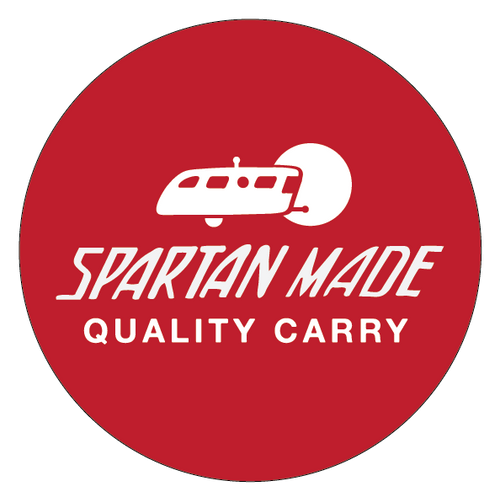Care & Repair
Here’s some care guidelines for each material we use.

Vegetable Tanned Leather
Vegetable tanning is an ancient process that uses natural materials high in tannins, hence the name. Less destructive than chrome tanning, and more labor-intensive, veg-tanned leathers are the most expensive and sought-after. They need to be occasionally rejuvenated to replace the natural oils and fats that make the leather supple, but reward the owner with years of durability and a deepening patina over time. Veg-tanned leathers will darken over time, and more quickly in the sun.
Care: If the leather appears dry, brittle, or heavily scuffed, apply a fine leather balm with a lint free cloth and buff with a horsehair brush. We make our own natural leather balm out of beeswax and other non-petroleum-derived products, but many similar formulas are available and will work to clean and condition leather. Saddle soap can be used to clean the leather, and a conditioner applied to keep it supple.

No. 2 Duck Natural Canvas
This amazing 32 oz heavy-duty canvas (a No. 2 Duck, or 2/0 "Naught" canvas) only comes from one factory and in one width. It’s typically used for conveyor belts in industrial bakeries, but time was that the “ought” canvases were used for items that needed to be indestructible, like saddlebags for mule trains.
Care: If there’s no leather on it, you can wash it, but if there’s leather (see above) we recommend spot cleaning it with a rag and some warm water and mild soap. Re-read Basho’s Records of a Travel-Worn Satchel and revel in the wabi-sabi goodness.

Waxed Canvas
Waxed canvas (sometimes called oilskin) has a long history and is a broad family of factories all sharing a basic characteristic: the application of oils and fats to make the textile waterproof. Cotton canvas is the most common base fabric, though some blends are used too. We use several kinds of waxed canvas for our bags, some naturally beeswaxed in the US, and others sourced from mills in England and Scotland, who have the longest history with this water resistant fabric.
Care: Do not machine wash and don’t use hot water! That will take out the waxes and oils that give the fabric its water resistance and unmistakable hand. Instead: spot clean with a clean rag and some cold water and mild soap. Every once in a while you can re-proof the wax yourself. There are several commercially available balms or wax bars you can use (like Otter Wax), or you can make your own. The beeswax canvas is easy to re-proof with a block of beeswax and a hair-dryer. Waxed canvas will last a VERY long time and will, like leather, patina over time.

X-PAC, Dyneema
We do use some innovative synthetics, especially for our sportier bags aimed at people with an active lifestyle. There’s some very cool stuff happening in the tech fabric sector. X-PAC and Dyneema are laminates, and both have their origins in competitive sailing, hence sometimes you see the word “sailcloth” used to describe them. Both have developed these ultralight, ultra-strong materials for other uses, and the UL (ultralight) hiking community and cyclists have embraced them for backpacks, fanny packs, and bicycle bags. X-PAC and Dyneema fabrics are waterproof, though the seams they’re sewn with are not (unless taped or sealed). They’ll also wrinkle over time, which is normal.
Care: Not much to it. Wash with warm water, a lint-free rag, and mild soap. It might withstand a washing machine gentle cycle, but there’s no need. Washing it out in the sink with a faucet sprayer would work just as well and be more gentle.

Repair
We craft items that we want to use ourselves, and we build them with the highest quality materials we can find. Many of our products are over-engineered because we suspect that you, like us, are pretty hard on the stuff you carry. That said, rips and tears happen, and the great thing about Spartan Made is that we offer repairs to our customers.
We’ll do our best to repair your item, and charge a nominal fee to cover labor, parts, and shipping.
We might be able to give you an estimate via email, but if not, we’ll ask you to send the item to our workshop, where we’ll inspect it, and send you a repair estimate from there.
Sometimes repairs aren’t possible, but we will do our best!
Contact us to initiate a repair order.
